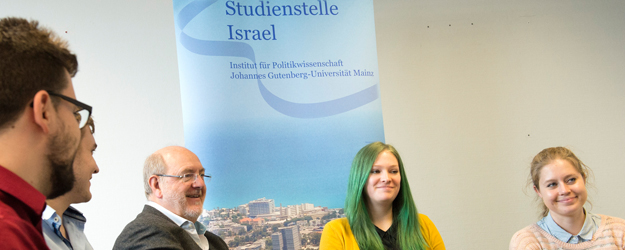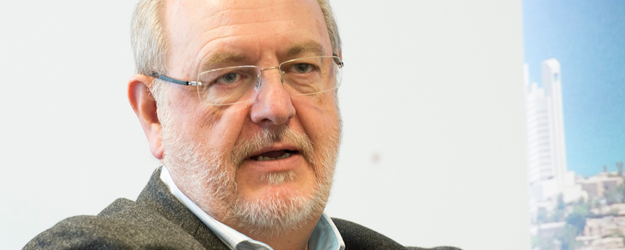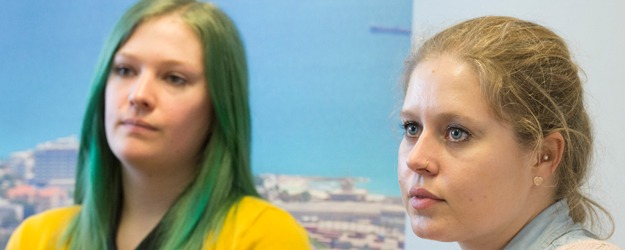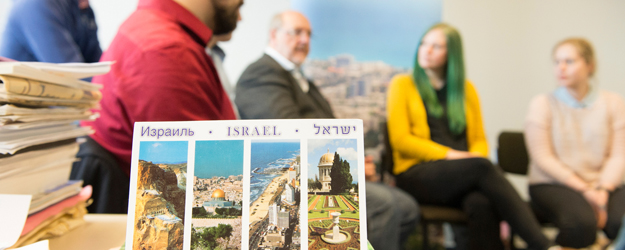16 April 2015
Post-war Germany takes up a very special stance on Israel, though often a rather limited one. The conflict in the Middle East is taking center stage while the shared German-Jewish history always plays an important role. It is the aim of the Israel Study Unit of the Institute of Political Science at Johannes Gutenberg University Mainz (JGU) to make Germans aware of the many other facets of the country. A current project is a major conference entitled "Rapprochement, Change, Perception and Shaping the Future: 50 Years of German-Israeli and Israeli-German Diplomatic Relations."
The various green tints of Mount Carmel dominate the foreground. Behind it gleam the white houses of Haifa, twin city of Mainz, with their expansive views of the Mediterranean which meets the blue of the sky at the horizon. The words "Studienstelle Israel," the German name of the Israel Study Unit, are printed at the top of the photo banner in Alfred Wittstock's office.
A number of students have gathered here. Wittstock himself sits right in the middle, although he clearly refuses to be the focus. "Anyway, they all say that I have a habit of butting in too much," says the head of the Israel Study Unit, looking round the circle with an ironic twinkle in his eye.
Spotlight on the students
It is obviously important to Wittstock to involve the students when it comes to explaining what the Israel Study Unit at the Institute of Political Science of Mainz University does. Because the latest project, the upcoming four-day conference "Rapprochement, Change, Perception and Shaping the Future: 50 Years of German-Israeli and Israeli-German Diplomatic Relations" would hardly have come about without them. Together with the Israel Study Unit, the students' own Israel Association organized the international event.
"The institutional Israel Study Unit was set up only some four or five years ago," recalls Wittstock. But he has been dealing with the topic of Israel at Mainz University for far longer. "It began in 1993 with a lectureship that later became full time." He does not want to go into too much detail. "That would be a long story." He rather prefers to talk about the subject that he teaches.
"It is essential that an Institute of Political Science like ours has Israel on its syllabus. The country is only about four hours away by plane and it is at the center of a conflict that is growing increasingly complex." It is thus important to deal with a whole range of different aspects. "The problem is that we primarily see Israel from the point of view of the Middle East conflict and in the context of anti-Zionism and anti-Semitism." Yet there is so much more.
Parties, minorities, people
The Study Unit offers courses on the economy, constitution, and society of Israel, in addition to classes on religion and Modern Hebrew. There are also guest lectures by experts from around the world. "Israel is roughly the same size as the state of Rhineland-Palatinate and has nine million inhabitants. It enjoys a rate of economic growth of which we can only dream," explains Wittstock. "We can look, for example, at its party political landscape. About 20 groups were represented in the most recent election. And we can ask ourselves how such a small country manages to function with its large Jewish majority and Arab minority, with so many different people."
But Wittstock decides that's enough from him. It's now time to let the students speak. "We are also interested in the specific German view of what is happening in Israel," says Laura-Luise Hammel of the Israel Association. "How did German news media cover the recent conflict in August 2014? Our shared history colors the way we in Germany see such things. Where is this reflected in the media and where are prejudices apparent?"
"It is the job of the media to condense things, to make them understandable for the general public," adds Marc Beer. "But what gets left out and what gets emphasized?" Wittstock continues to elaborate on the theme of the historical dimension. "Those who actually witnessed the Holocaust and the foundation of Israel are now dying out. So the question now is what images of Israel and Judaism are emerging that are becoming stereotypes and no longer subject to revision?"
Destination Israel
Academic scrutiny of Israel is supplemented by study trips to the country. Annkatrin Landfried was there in 2012. "We had a daily program from 9:00 pm in the morning to 8:00 pm in the evening. It was sometimes very exhausting. But we were given the opportunity to interview an air force general, the German ambassador to Israel, Andreas Michaelis, and Avi Primor, former Israeli ambassador to Germany, among other people." This was the result of Wittstock's wide range of contacts.
Of course, there were a lot of other aspects to discover in the short time available. "Israel is the only Western-style democracy in the Middle East. This is reflected in the liberal attitude and leisure time activities pursued in cities such as Tel Aviv and Haifa. They have a lifestyle very similar to ours and there is an international flavor to everything."
The Israel Association brings together all students with an interest in Israel. This interest is particularly apparent among the small group who have gathered in Wittstock's office. One of them, Farsin Alikhani, sees Israel from a special perspective. "My father is of Iranian descent," he explains. "The current regime in Iran seems to think that if a sack of rice falls over in Iran it's all the fault of the Israelis." And he believes that "the solution to the Middle East conflict is the key to peace in the entire region."
Conference on the anniversary
The Study Unit and the Association are now organizing the four-day conference "Rapprochement, Change, Perception and Shaping the Future: 50 Years of German-Israeli and Israeli-German Diplomatic Relations" to mark the 50th anniversary of the establishment of diplomatic relations between Israel and Germany.
"We have been working on the preparations for a year," discloses Wittstock. The Israel Study Unit sought sponsors while the students worked out what the main topics should be. "We decided we did not want to simply chronologically outline the history of the relationship between our two countries," emphasizes Timo Konrad. "We identified relevant themes and then considered which speakers we should invite."
The conference will begin on April 27, 2015, in the Rhineland-Palatinate State Parliament; further events will be held on the Gutenberg campus and at the Mainz State Theater. Some 20 contributors from Mainz, Tel Aviv, Jerusalem, and Brussels will be speaking at the conference entited "Rapprochement, Change, Perception and Shaping the Future: 50 Years of German-Israeli and Israeli-German Diplomatic Relations." Under the patronage of Rhineland-Palatinate's Minister-President Malu Dreyer, it will of course be looking at policy and security issues, but also art and culture as well as the attitudes of young people in both countries will be on the agenda. The conference will be varied and colorful. There is much to be discovered.




